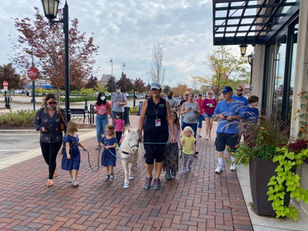Benefits of Animal Therapy
Our SOUL Harbour Ranch Animal Therapy Program volunteers have gone through extensive training and testing to become registered Pet Partners animal therapy teams. What do we do and why? See benefits below! (*credit Pet Partners)
AAA/AAT COMPARISON*: WHAT IS AAA? AAT? EAA/EAT?
AAA (Animal-Assisted Activities) are basically the casual “meet and greet” activities that involve pets visiting people. The same activity can be repeated with many people, unlike a therapy program that is tailored to a particular person or medical condition.
AAT (Animal-Assisted Therapy) is a goal-directed intervention directed and/or delivered by a health/human service professional with specialized expertise, and within the scope of practice of his/her profession. AAT is designed to promote improvement in human physical, social, emotional, and/or cognitive functioning.
EAA and EAT (Equine-Assisted Therapy) used interchangeably when equines/horses are used for activity or therapy visits, like the SOUL Harbour Ranch Animal Therapy Program! Because Pet Partners is not animal-specific or equine exclusive, we use their broader terms of AAA/AAT.
BENEFITS OF THE HUMAN ANIMAL BOND AND ANIMAL-ASSISTED INTERVENTIONS (ACTIVITIES/THERAPIES) *
Human Animal Bond and Human-animal interactions may provide the following benefits to adults and children in a variety of human care facilities:
EMPATHY
Studies report that children who live in homes in which a pet is considered a member of the family are more empathetic than children in homes without pets. Children see animals as peers. It is easier to teach children to be empathetic with an animal than with a human. With therapy animals, what you see is what you get. Humans are not as direct. Children can be taught to read an animal’s body language. Understanding what an animal is feeling is easier than determining what a person is feeling because the animal is straightforward and lives in the moment. As children get older, their ability to empathize with animals will carry over into their experiences with people.
OUTWARD FOCUS
Individuals who have mental illness or low self-esteem focus on themselves; animals can help them focus on their environment. Rather than thinking and talking about themselves and their problems, they watch and talk to and about the animals.
NURTURING
Nurturing skills are learned. Many at-risk children have not learned nurturing skills through the traditional channel – their parents. By being taught to take care of an animal, the children can develop these skills. Psychologically, when a person nurtures, his/her need to be nurtured is being fulfilled.
RAPPORT
Therapy animals can open a channel of emotionally safe, non-threatening communication between client and therapist. In therapy settings, therapy animals help present an air of emotional safety. If a therapist has an animal in his/her office, s/he “can’t be all bad.” The animal’s presence may open a path through the person’s initial resistance. Children are especially likely to project their feelings and experiences onto an animal.
ACCEPTANCE
Animals have a way of accepting without qualification. They don’t care how a person looks or what they say. An animal’s acceptance is nonjudgmental, forgiving, and uncomplicated by the psychological games people often play.
ENTERTAINMENT
At a minimum, the presence of an animal can be entertaining. Even people who don’t like animals often enjoy watching their antics and reactions. Especially in long-term care facilities, it seems everyone is entertained by animal visits in some way.
SOCIALIZATION
Studies have shown that when therapy dogs and therapy cats come to visit a care facility, there is more laughter and interaction among residents than during any other “therapy” or entertainment time. In an inpatient setting, the presence of animals encourages socialization in 3 ways: Between clients, between clients and staff, and between clients, staff, and family or other visitors. Staff members have reported that it is easier to talk to residents during and after animal visits. Family members often come during the animal visits and some have reported that it is an especially comfortable and pleasant time to come.
MENTAL STIMULATION
Mental stimulation occurs because of increased communication with other people, recalled memories, and the entertainment provided by the animals. In situations that are depressing or institutional, the presence of the animals serves to brighten the atmosphere, increasing amusement, laughter, and play. These positive distractions may help to decrease people’s feelings of isolation or alienation.
PHYSICAL CONTACT/TOUCH
Much has been written about the correlation between touch and health. Infants who are not touched do not develop healthy relationships with other people and often fail to thrive and grow physically. For some people, touch from another person is not acceptable, but the warm, furry touch of a therapy dog or therapy cat is. In hospitals, where most touch is painful or invasive, the touch of an animal is safe, non-threatening, and pleasant. There are a number of programs for people who have been physically or sexually abused in which staff and volunteers are not allowed to touch the clients. In cases like these, having a therapy animal to hold, hug, and touch can make a world of difference to people who would otherwise have no positive, appropriate physical contact.
PHYSIOLOGICAL BENEFITS
Many people are able to relax when therapy animals are present. Tests have shown that the decrease in heart rate and blood pressure can be dramatic. Even watching fish swim in an aquarium can be very calming.
SOMETHING MORE
When they are with the therapy animals, some people feel spiritual fulfillment or a sense of oneness with life and nature. This is hard to define or explain. Some well-known authors have described their relationships with animals and nature as part of their sustaining life energy and/or part of their communion and relationship with God. Albert Schweitzer, George W. Carver, and J. Allen Boone (author of Kinship with All Life), among others, express this “something more” in their writing and work.
BENEFITS OF THE HUMAN-ANIMAL BOND*
The human-animal bond is a mutually beneficial and dynamic relationship between people and therapy animals that positively influences the health and well-being of both. While many of us intuitively understand the benefits of positive interactions with animals in our lives, an emerging body of research is recognizing the impact the human-animal bond can have on individual and community health.
Just a few examples of therapy animals improving the physical, social, and emotional health of clients:
-
A therapy dog has a positive effect on patients’ pain level and satisfaction with their hospital stay following total joint arthroplasty (Harper, 2014) [1].
-
Fibromyalgia patients spending time with a therapy dog instead of in an outpatient waiting area at a pain management facility showed significant improvements in pain, mood and other measures of distress (Marcus, 2013) [2].
-
A walking program that matched sedentary adults with therapy animals resulted in an increase in walking over a 52 week graduated intervention with the participants stating their motivation for adherence was “the dogs need us to walk them” (Johnson, 2010) [3].
-
The presence of an animal can significantly increase positive social behaviors among children with autism spectrum disorder (O’Haire, 2013) [4].
-
Children made fewer errors in match-to-sample categorization task in the presence of a dog relative to a stuffed dog or human (Gee, 2010) [5]. Similar studies may indicate presence of a dog serves as both a source of motivation and a highly salient stimulus for children, allowing them to better restrict their attention to the demands of the task (Gee, 2012) [6].
-
Therapy animals in pediatric cancer studies improved motivation to participate in treatment protocol, to maintain their motivation over time, and to want to “get better” or stay optimistic (Sobo, 2006) [13], (Barker, 2008) [14].
Benefits extend to our companion animals and the presence of pets in our lives:
-
Pet ownership, perhaps by providing social support, lowers blood pressure response to mental stress (Allen, 2001) [7].
-
Pet owners have higher one-year survival rates following heart attacks (Friedmann, 1980, 1995) [8,9].
-
Recognizing and nurturing the connection between animals and humans has potential implications for individual stability and health, improved economic outputs and healthcare cost savings (Takashima, 2014) [10]. This conclusion was based on a number of studies.
-
Pet ownership, particularly dog ownership, may be reasonable for reduction in cardiovascular disease risk (Levine, 2013) [11].
-
Pet ownership was associated with a reduced risk for Non-Hodgkin’s lymphoma and diffuse large cell lymphoma (Trahan, 2008) [12].
-
Human health savings of $3.86 billion over 10 years have been linked to pet ownership as related to a decrease in doctor visits in studies in Austria and Germany (Heady, 2002) [15].
Whether it is pet ownership that gives us cause to exercise, offers an antidote for loneliness, and gives us loving companions to care for, or animal-assisted interventions that improve motivation to participate in treatment and lessen worry, anxiety, and pain, we recognize that animals can influence not just our happiness but also our health.
Hours of Operation: Pre-arranged/By Appointment Only. Proudly Serving McHenry County, Lake, Cook & Kane Counties to include the cities of: Chicago, Cary, Crystal Lake, Fox River Grove, Lake In The Hills, Algonquin, Barrington, North Barrington, Lake Barrington, Tower Lakes, South Barrington, Lake Barrington, Wauconda, Long Grove, McHenry, Hoffman Estates, Palatine, Arlington Heights, , Mount Prospect, Kildeer, Deer Park, Schaumburg

























